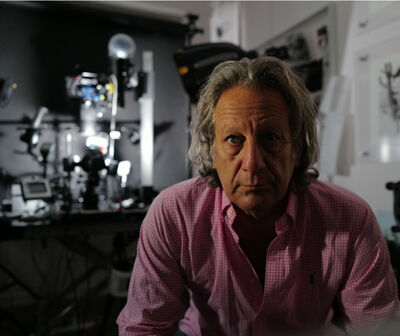Will the sun damage lens coatings?
Apr 12, 2024 06:23:10 #
azted wrote:
Nice work. The solar flares are very well defined!
Thank you very much for your kind words.
Apr 12, 2024 06:25:32 #
Earnest Botello wrote:
Great set, Robert. I am not an expert, but unless you leave the camera sitting pointed at the sun for a many, many hours in one place I doubt that the lens will be damaged in any way using it for a few minutes.
You may be right, however, I don’t want to risk damaging my lens. That would be a really sad day. It was $14,000. I ordered a solar sheet to cover the front element. Will see how that works.
Apr 12, 2024 06:26:33 #
Orphoto wrote:
Will be curious to see how the henhouse reacts here.
Me too! Thank you.
Apr 12, 2024 06:29:22 #
wdross wrote:
The main problem with a drop-in filter is getting ... (show quote)
Thank you. Taking out the drop in filter is pretty much instantaneous, just turn the release knob and lift out. I am nervous about exposing the lens and camera to excessive heat and light. I make a front lens cover out of the filter material I ordered on Amazon to avoid the issue altogether. 8"x8" Solar Filter Sheet for Telescopes, Binoculars and Cameras
https://a.co/d/jfEQe6W
Apr 12, 2024 06:33:33 #
DirtFarmer wrote:
I seriously doubt that solar exposure would damage your lens coatings. After all, you go out and about with your lens frequently. What does it matter whether you are pointed at the sun or not. The sun light falls on your lens unless you are pointing away from the sun.
The only way that damage would be likely is if the solar disk were focused on a part of the lens. Otherwise, normal exposure to sunlight will not affect it.
The only way that damage would be likely is if the solar disk were focused on a part of the lens. Otherwise, normal exposure to sunlight will not affect it.
Maybe. But if the energy from the light were to focus on any of the elements for any amount of time, and it damaged any of the elements, that would trash the lens. I don’t want to take that risk. (Very expensive lens. $14k)
Since we don’t have another total eclipse for another 20 years, I have time to make a solar filter to cover the front element of the lens. Will do using this. 8"x8" Solar Filter Sheet for Telescopes, Binoculars and Cameras
https://a.co/d/jfEQe6W
Apr 12, 2024 06:36:37 #
cahale wrote:
I can't answer that with reasonable certainty. I do know that I do not have a sufficiently dark neutral density filter to do the job. I do, however, have a large variety of them, and overcame the problem by stacking a bunch of them. Worked like a charm - both camera wise and allowing me to observe through them. Sometimes serendipity is served by pack-rattiness.
Makes sense. I did buy a 77mm 10 stop solar filter for my 100-400. Worked well.
Just want to use my 2.8 400 to see if I get better results, but do not want to risk damaging it.
Apr 12, 2024 06:38:06 #
bhapke wrote:
I don't know from personal information but did hear on a podcast by an astronomer and photographer that you should not use any filter that doesn't cover the front of the lens. He specifically mentioned that drop-on filters were not suitable.
This is good information to start with. A bit of logic based caution will certainly serve us well. Thank you.
Apr 12, 2024 06:38:40 #
nervous2 wrote:
Very nice shots.
Thank you very much!!!
Apr 12, 2024 06:41:37 #
User ID wrote:
I keep protective filters on all of my lenses to protect the coatings from from solar radiation.
Yes. I do as well. However, I never point my lens directly at the sun, unless it’s a sunset. Now I have filters to protect camera a lenses when shooting the sun when it is at full intensity. I would hate to damage any of my equipment by doing something I should not do that is avoidable.
Apr 12, 2024 06:44:02 #
Thank you all for your thoughtful responses. Based on your insights, I will not use a drop in filter, but make a front cover out of cutable solar Mylar that eliminates the risk of damaging lenses and camera.
8"x8" Solar Filter Sheet for Telescopes, Binoculars and Cameras
https://a.co/d/jfEQe6W
8"x8" Solar Filter Sheet for Telescopes, Binoculars and Cameras
https://a.co/d/jfEQe6W
Apr 12, 2024 07:10:35 #
Do NOT use drop in filters for solar viewing. Once the sun is magnified (your lens)...look out.
The filter has to be in a place to stop the suns rays BEFORE magnification.
The filter has to be in a place to stop the suns rays BEFORE magnification.
Apr 12, 2024 07:13:57 #
Canisdirus wrote:
Do NOT use drop in filters for solar viewing. Once the sun is magnified (your lens)...look out.
The filter has to be in a place to stop the suns rays BEFORE magnification.
The filter has to be in a place to stop the suns rays BEFORE magnification.
I thank you! Will not use drop in filters, but will protect lens and camera by placing solar filters in front of the lens. Glad I asked the question!
Apr 12, 2024 07:26:59 #
Robertl594 wrote:
Maybe. But if the energy from the light were to focus on any of the elements for any amount of time, and it damaged any of the elements, that would trash the lens. I don’t want to take that risk. (Very expensive lens. $14k) ...
(1) damage to a lens element can be repaired. The lenses come apart (don't try this at home) and you can have a damaged element replaced. So although it would cost you, it wouldn't be a total loss.
(2) I see the probability of damage to an element of a complex lens from sunlight as being extremely low. I don't know your lens configuration but I view it as very unlikely that the solar disk would be focused on an internal element (absent extraneous lens elements placed in front of your lens). If that were a problem, you would have to place a protective filter on your lens at all times. Not just when you're aiming at the sun, but any time your lens is vaguely pointed anywhere within the hemisphere that contains the sun. That would make it very difficult to get proper exposures for ordinary photos or it would limit the photos you could take to non-backlit subjects. And it's possible that just setting your camera on a table, the sun could move around and sunlight could get into your lens. How often does that happen? Have you ever taken a photo toward a sunset but while the sun was still up (but not in the center of your field of view)?
The problem with aiming your camera at the sun is more likely that you would see damage on the sensor or the shutter (also replaceable elements). That's where the solar disk will be focused. (Watch out for your mirrorless cameras).
Apr 12, 2024 07:37:52 #
DirtFarmer wrote:
(1) damage to a lens element can be repaired. The ... (show quote)
Thank you. While you may be right, I do not think it prudent to take the risk when I can avoid the possibility of damaging anything by using a $20 filter. Camera: $6,000, lens: $14,000. Filter $20. While the lens elements can be replaced, it’s expensive and time consuming.
I am glad I asked the question. I got a lot of good answers to help me do the best things to eliminate the risks.
Apr 12, 2024 08:40:00 #
wdross
Loc: Castle Rock, Colorado
User ID wrote:
I keep protective filters on all of my lenses to protect the coatings from from solar radiation.

If you want to reply, then register here. Registration is free and your account is created instantly, so you can post right away.

